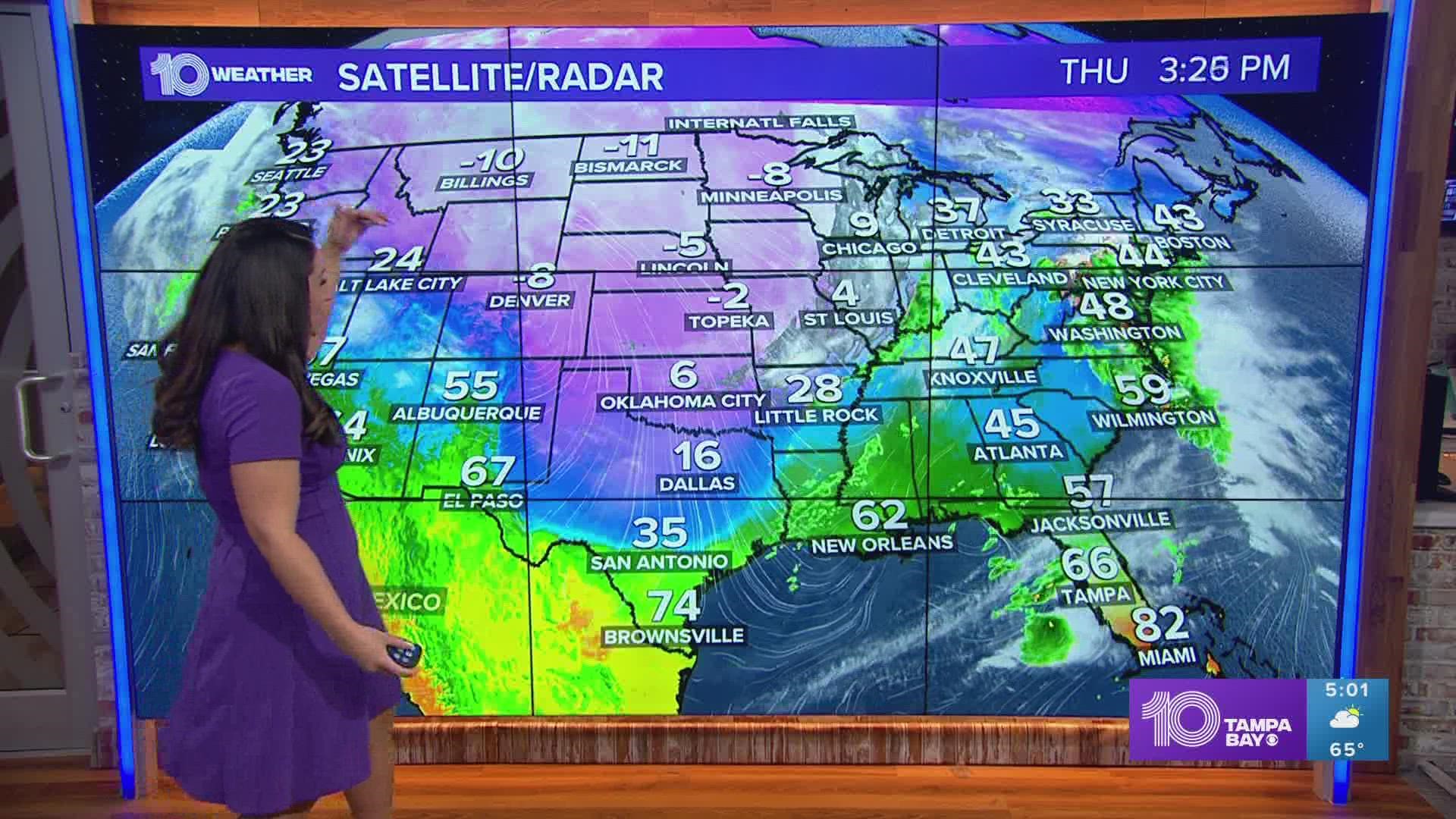TAMPA, Fla. — As a strong cold front is making its way toward the Tampa Bay area in the coming days, now's the time to make preparations around the house to protect your belongings.
When temperatures drop, there's the possibility that your pipes and sprinklers will freeze – which is never a good thing.
Here are some steps to take to make sure everything makes it through the cold front safely.
Pipes
When water freezes in pipes, its volume expands and puts pressure on the pipe from inside, The Home Depot explains. This can lead to the pipe bursting and causing plumbing damage.
The home improvement company came up with a number of steps for people to take to make sure their pipes don't freeze, including:
- Insulate pipes located in the attic and crawl space using pipe insulation, even if the climate where you live does not often have hard freeze conditions. You can also wrap pipes in heat tape or heat cables with a thermostat control. The best pipe insulation for your situation will depend on your home. Always install according to the manufacturer's directions.
- Seal or caulk any cracks that might let in cold air, especially places where pipes run from inside to outside the home, such as dryer vents or water pipes.
- Preventing frozen pipes should be done outdoors as well. As you winterize your home, disconnect your garden hoses.
- For any outdoor faucets with cut-off valves, be sure they are closed and faucets are drained. You can also protect them by using faucet covers throughout the winter months.
- If cold weather settles in and you notice temperatures beginning to drop, start a small drip of both hot water and cold water in the kitchen, bath, laundry areas and any other faucets in the home. A small water drip is all that is needed to keep water moving through the system and prevent frozen pipes.
- Be sure to alert a trusted neighbor if you'll be away more than a few days, and ask them to check periodically to make sure that the measures you have taken in preventing frozen pipes worked and that nothing has ruptured.
Click here for more tips on how to find out if the pipes are frozen and how to thaw them.
"Typically, pipes in Florida aren’t designed for that extreme temperature, and there are many pipes that go into the home that aren't insulated and directly exposed to the air," Director of Tampa Water Department, Chuck Breit, said. "So when the air temperature drops below freezing, those pipes will freeze."
If your pipes burst, Breit said the first thing to do is shut off the water.
"That's going to prevent the worst type of damage," he added. "So knowing where you're shut off now is before it gets cold is a really good idea."
Sprinklers
When temperatures drop, it's possible for sprinkler systems to be damaged if not properly prepared.
Rain Bird broke down four different steps to take to ensure that people's irrigation systems are prepared.
- Insulate your assets
- Shut off the water supply to the irrigation system. The main shut-off valve for your irrigation system needs to be protected against freezing. Make sure it is wrapped with insulation (foam insulation tape and a plastic bag) to protect it from harsh winter temperatures and prevent it from freezing. If you do not have a main shut-off valve, you might consider installing one as a preventative investment. Also, any above-ground piping needs to be insulated. Self-sticking foam-insulating tape or foam-insulating tubes commonly found at home supply stores are fine.
- Stay in control
- If you have an automatic system then you will need to "shut down" the controller (timer). Most controllers have a "rain mode" which simply shuts off the signals to the valves. The controller continues to keep time, the programming information isn't lost (start times, valve run times, etc.) and the clock continues to run throughout the winter. The only change is that the valves will not activate. If your controller is responsible for activating a pump, as a precaution you should remove the wires that are connected to the MV (Master Valve) and common terminals. This will prevent the possibility of the pump being accidentally activated which could cause damage from overheating. An alternative to using the rain mode is simply to shut off the power to the controller. If you do, you'll need to reprogram the time and potentially all your other settings as well, in the spring.
- Drain the pipes
- Now you need to remove the water from the pipes and sprinklers so that it won't freeze/expand and break the pipe. There are several ways to drain your pipes: a manual drain valve, an automatic drain valve or the compressed air blow-out method. However, since there could be potential safety risks we recommend contacting your local irrigation specialist. Many offer sprinkler winterization services this time of the year.
- Protect valves and backflow preventers
- Insulate backflow preventers and valves if they are above ground. You can also use insulation tape for this. Be sure not to block the air vents and drain outlets on backflow preventers.
The front is expected to sweep across the Tampa Bay area late Thursday night into Friday morning. Highs on Friday will likely be during the morning hours with dropping temperatures into the afternoon as cold air pours south behind the front.
Temperatures will continue to drop Friday night into Saturday morning. Christmas Eve morning (Saturday) will likely be the coldest part of this air mass for central Florida. Christmas Day will be cold also, but will be a touch warmer compared to Christmas Eve.
Read more about the upcoming cold front by clicking here.

